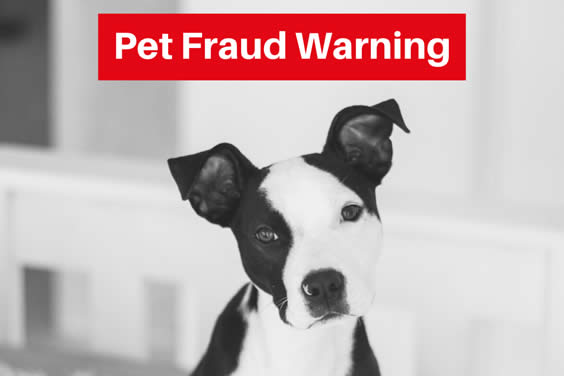bulletin from Suffolk Trading Standards
Throughout the Coronavirus pandemic we have seen a rise in reports of fake pet sales, in particular puppies and kittens, being advertised for sale via social media and online pet sale platforms.
The fraudsters will place an advert of the pet for sale, often claiming that the pet is currently held somewhere less accessible or overseas. The fraudsters are also using lockdown as a way of stopping buyers from visiting to look at the animal. Upon agreement of a sale, the suspect will usually request an advance payment by money transfer or bank transfer. However, the pet does not materialise. The fraudster is then not contactable or will subsequently ask for further advanced payments for courier charges, shipping fees and additional transportation costs. Even if further payments are made, the pet will still not materialise as it is likely to not exist.
Three recent cases in Suffolk have resulted in residents losing substantial sums of money.
One complainant made enquiries on a Facebook page advertising dogs available for rehoming, the resident was supplied with photos of the puppy they were interested in, and they were emailed documents that used the details of a Suffolk veterinary practice, indicating that the dog had been vaccinated. These documents were false, and fraudulently used the details and logo of the veterinary practice. The Facebook page is a fake page, set up with the sole intention of stealing money from unsuspecting buyers
Another complainant found a seller of puppies on an online pet selling platform, the seller again sent lots of photos, convincing the Suffolk resident to pay a £750 deposit, and to send copies of their driving license as proof of identity. Once payment was received all communications stopped.
Lastly, a Suffolk resident drove to Liverpool to buy a dog they had seen available online. Returning home and making the dog very much part of their family, they took the puppy to the vets. The Vet soon discovered that the puppy was only 11 weeks old, and the passport that accompanied it was fake. The puppy would have been too young to have received it’s vaccinations, and as such it it thought to be an illegal importation. The puppy is now in quarantine.
The UK has been free from rabies for many years. However rabies is still present in many countries across the world. This is why the UK has importation controls for pet animals.
These controls are designed to stop rabies and other exotic diseases from being introduced into the UK. All dogs and cats must be microchipped and vaccinated against rabies before entering the UK.
Tips to staying safe when purchasing pets:
- Be cautious if the seller initially requests payment via one method, but later claims that due to ‘issues with their account’ they will need to take the payment via an alternative method such as a bank transfer.
- Consider conducting research on other information provided by the seller, for example a mobile phone number or email address used by the seller could alert you to any negative information associated with the number/email address online.
- Request details of the courier company being used and consider researching it.
- Agree a suitable time to meet face-to-face to agree the purchase and to collect the pet. If the seller is reluctant to meet then it could be an indication that the pet does not exist.
- A genuine seller should be keen to ensure that the pet is going to a caring and loving new home. If the seller does not express any interest in you and the pet’s new home, be wary.
- If you think the purchase price is too good to be true then it probably is, especially if the pet is advertised as a pure-breed.
- Do not be afraid to request copies of the pet’s inoculation history, breed paperwork and certification prior to agreeing a sale. If the seller is reluctant or unable to provide this information it could be an indication that either the pet does not exist or the pet has been illegally bred e.g. it originates from a ‘puppy farm’. A ‘puppy farm’ is a commercial dog breeding enterprise where the sole aim is to maximise profit for the least investment. Commercial dog breeders must be registered with their local authority and undergo regular inspections to ensure that the puppies are bred responsibly and are in turn fit and healthy. Illegally farmed puppies will often be kept in inadequate conditions and are more likely to suffer from ailments and illnesses associated with irresponsible breeding.
- When thinking of buying a pet, consider buying them in person from rescue centres or from reputable breeders.
If you have been affected this or any other scam, please report it to us via 0808 223 1133.
